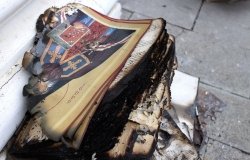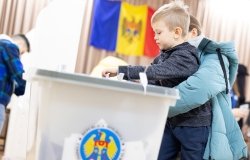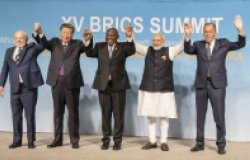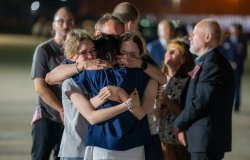
A blog of the Kennan Institute
Putin’s Annexation Miscalculation

Wikimedia Commons/AgniArt.ru
We are fast approaching the one-year anniversary of Russia’s invasion of Ukraine. Everyone is expecting an escalation of the war this spring – Russia is poised to mobilize more troops, while Ukraine will deploy its new tanks and artillery, all in an attempt to produce a decisive military result.
But if neither side seems willing to blink, it is Vladimir Putin who appears to possess fewer options. Most notably, his decision to annex certain territories, as opposed to merely occupying them (or leaving behind unresolved “frozen conflicts”), has backed Putin into a corner. Both institutional changes wrought under his direction – as well as the weight of Russian history – may keep him there.
Constitutional Amendments and Failing Institutional Integrity
Putin’s twenty-plus years in power demonstrate that he clearly does not feel bound by Russian law. In 2020, he rewrote the Russian constitution, limiting the powers of the legislature, incorporating local self-government into a “unified system of public power,” and granting himself a personal exemption to the two-consecutive-terms limit on holding the presidency established in Russia’s original 1993 founding law.
In retrospect, however, Putin’s 2020 Russian constitutional amendments also foreshadowed his intentions in Ukraine. The changes included an obscure provision that forbids the Russian Federation from giving back any territory that is declared to be a part of the country. The article was initially thought to deal with Crimea (and the Kurile Islands). The decision to annex several Ukrainian provinces (Donetsk, Luhansk, Kherson, Zaporizhzhia) in 2022, however, now puts this provision in a new light.
Essentially, Putin cannot withdraw from – or even negotiate about – these provinces without undermining one of his new core principles. Therefore, Putin cannot simply declare victory and go home, since such a declaration would now lead to the alienation of “Russian” land.
Thus, observers contemplating any possible end-game scenario to this tragic war must consider that from Putin’s standpoint, all of Russia’s territorial integrity – including the newly annexed provinces – is on the line.
Integration versus Control
How has Putin tried to integrate these new regions seized from Ukraine? Ironically, despite Putin’s overt disregard for law, it has been primarily through new legislation. Putin has doubled down on the legal integration of these four territories. They now are included in the (further amended) Russian constitution, a decision later ratified by the Constitutional Court. Phony referendums on whether to join Russia were conducted in each region, followed by the introduction of Russian law and legal institutions (a procuracy, an investigative committee, a bar association, a judiciary). Moreover, the annexed territories will be included in Russia’s national projects, social services guidelines, minimum wage requirements, and customs regulations.
These new procedures and legal reforms, however, do not necessarily equate to control over the new territories. Most famously, the Ukrainian army recaptured Kherson in November 2022 in one of Russia’s most significant defeats of the war. That still did not stop Kremlin spokesman Dmitry Peskov from asserting that Kherson remained part of the Russian Federation.
In fact, these bold assertions of Russian sovereignty seem intended to shore up a Potemkin village (i.e., a façade), a comparison underscored by the important ties this region retains to the historical figure of Grigory Potemkin, governor-general of Russia’s southern provinces. He is best remembered for his local military victories and for founding the cities of Kherson and Odesa (as well as for his love affair with Catherine the Great). But Potemkin has recently received renewed attention for another reason. In a macabre twist on the warrior’s creed, “No soldier left behind,” the Russian army raided Potemkin’s grave during its occupation of Kherson and allegedly brought his bones back to Moscow.
Putin’s Vulnerability
Short of outright victory – or finding the remains of more 18th century Russian generals to commemorate – Putin does not appear to have a clear back-up plan for his political (and even personal) survival. Putin seemed to have been looking over his shoulder when he rewrote the constitution in 2020. He provided any former president with lifetime immunity even if the president resigned or was unable to finish his or her term. A former president also receives a lifetime seat on the Federation Council (parliament’s upper house), which comes with lifetime immunity as well.
The inspiration for these protections may have come from Putin’s fellow long-term autocrat, Nursultan Nazarbayev. Even after Nazarbayev stepped down as Kazakhstan’s president in 2019 after twenty-eight years in office, he remained the head of the Kazakh security council, with the added constitutional status of “Leader of the Nation.” Both these titles – as well as his status of senator for life – later were rescinded in 2022 in the aftermath of an outbreak of violence that was fueled in part by the longtime corruption of Nazarbayev and his family. His immediate family was also stripped of its immunity.
The cost for Putin of avoiding Nazarbayev’s fate appears to be growing by the day. Putin needs to find upwards of 300,000 troops for a spring offensive, knowing that his previous attempts at mobilization sent Russian draft-age men running to any available exit. He has devastated Ukraine’s civilian infrastructure and, in the process, left himself vulnerable to potential charges of war crimes that will take years to resolve. Russia’s rainy day funds and budget surpluses disappeared overnight. One in ten Western businesses have fled the country, taking their investment, know-how, and tax revenues with them.
Putin possesses no reserves of soft power, although he has pledged to send Russian students to rebuild Donetsk (but only when it is safe, he says). In fact, the only reconstruction plans that Putin has promised Ukraine is the building of twenty-four new prisons, an ominous sign of what awaits that country if it loses the war.
A Particularly Russian Destiny
In the final analysis, Putin followed the playbook of every successful Russian leader (Peter the Great, Catherine the Great, Alexander I), in the sense that the historical legacy of the person who helms the nation depends on how much territory he or she added to the Russian Empire. In contrast, those leaders who lose territory are invariably remembered as failures. Such was the fate of Mikhail Gorbachev, whose reputation remained forever diminished by the collapse of the Soviet Union.
Putin subsequently piled on the criticism of Gorbachev—without mentioning his name—when he lamented the demise of historical Russia in the aftermath of the Soviet Union’s breakup. When Gorbachev died in 2022, Putin organized no state funeral and paid his personal respects for all of approximately 45 seconds while Gorbachev lay in state in the House of the Unions in Moscow. Putin later said he was too busy to attend the funeral.
Ironically, Putin seems destined to a similar fate as Gorbachev with the loss of the annexed territories, with one major exception. He will not share the universal praise that Gorbachev received upon his death as a leader who tried to expand the freedoms of the Russian and Soviet people. In contrast, Putin’s legacy now includes decreased civil rights, a ruthless crackdown on domestic dissent (real or imagined), military defeat, and the loss of newly-claimed Russian territory.
In the final analysis despite the Kremlin’s furious attempts to whitewash Russian atrocities and military setbacks, the basic facts surrounding Russia’s war of aggression are not in doubt, and Putin’s attempt to hide behind a Potemkin Village built on lies and disinformation has not fooled anyone. Instead, a physical, environmental, cultural and humanitarian wasteland has been inflicted on the Ukrainian people that will forever bear Putin’s name.
The opinions expressed in this article are those solely of the author and do not reflect the views of the Kennan Institute.
See our newest content first.
Subscribe to receive the latest analysis from the Russia File blog.
About the Author

William E. Pomeranz
William Pomeranz, Senior Fellow and former Director of the Wilson Center’s Kennan Institute, is an expert guide to the complexities of political and economic developments in Russia, particularly through the lens of law. He leverages extensive, hands-on experience in international and Russian jurisprudence to address a wide range of legal issues, from the development of Russia’s Constitution to human rights law to foreign investment and sanctions. He is also the author of Law and the Russian State: Russia's Legal Evolution from Peter the Great to Vladimir Putin (Bloomsbury, 2018).
Read More
Kennan Institute
The Kennan Institute is the premier US center for advanced research on Eurasia and the oldest and largest regional program at the Woodrow Wilson International Center for Scholars. The Kennan Institute is committed to improving American understanding of Russia, Ukraine, Central Asia, the South Caucasus, and the surrounding region though research and exchange. Read more













